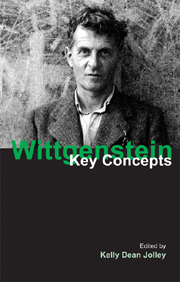Book contents
- Frontmatter
- Contents
- Contributors
- Abbreviations
- Introduction
- 1 Wittgenstein's philosophical remarks
- 2 Wittgenstein on meaning and meaning-blindness
- 3 Language-games and private language
- 4 Wittgenstein on family resemblance
- 5 Ordinary/everyday language
- 6 Wittgenstein on rule-following
- 7 Thinking and understanding
- 8 Psychologism and Philosophical Investigations
- 9 Moore's paradox revisited
- 10 Aspect perception
- 11 Knowing that the standard metre is one metre long
- 12 Therapy
- 13 Criteria
- 14 Grammatical investigations
- 15 Teaching and learning
- 16 Expression and avowal
- Chronology of Wittgenstein's life
- Bibliography
- Index
5 - Ordinary/everyday language
- Frontmatter
- Contents
- Contributors
- Abbreviations
- Introduction
- 1 Wittgenstein's philosophical remarks
- 2 Wittgenstein on meaning and meaning-blindness
- 3 Language-games and private language
- 4 Wittgenstein on family resemblance
- 5 Ordinary/everyday language
- 6 Wittgenstein on rule-following
- 7 Thinking and understanding
- 8 Psychologism and Philosophical Investigations
- 9 Moore's paradox revisited
- 10 Aspect perception
- 11 Knowing that the standard metre is one metre long
- 12 Therapy
- 13 Criteria
- 14 Grammatical investigations
- 15 Teaching and learning
- 16 Expression and avowal
- Chronology of Wittgenstein's life
- Bibliography
- Index
Summary
Wittgenstein is in practice generally thought to be some variety of “Ordinary-Language” Philosopher, that is, a philosopher who takes ordinary language (as opposed to scientific language, to “technical” language, or to its bastard child, “super-scientific” (“metaphysical”) language) to be our keystone in philosophy; and who thinks that philosophy can proceed therefore by means of paying careful attention to the way we normally actually speak, and prohibiting uses that conflict with the way we normally actually speak.
And indeed, what “ordinary/everyday language” is taken to be opposed to is critical. The key point of this chapter is however to suggest, contra what still tends to be the prevailing wisdom, that the crucial mistake in “Wittgenstein studies” has generally been to misidentify the contrast class that Wittgenstein intended. I call it “the crucial” mistake, for the mistake has (had) enormous consequences, as I shall seek briefly to demonstrate.
We should begin with the single most important passage in Philosophical Investigations for understanding Wittgenstein's employment of the term “everyday”:
When philosophers use a word – for instance “knowledge”, “being”, “object”, “I”, “proposition”, or “name” – and try to grasp the essence of the thing, one must always ask oneself: is the word ever actually used in this way in the language, which is after all its home? // What we do is to bring words back from their metaphysical to their everyday use.
The first thing to say about this famous passage is that it opens with a question; and that the sentence that follows does not answer the question (or at least, does not “reveal” it to have been a merely rhetorical question).
- Type
- Chapter
- Information
- WittgensteinKey Concepts, pp. 63 - 80Publisher: Acumen PublishingPrint publication year: 2010

